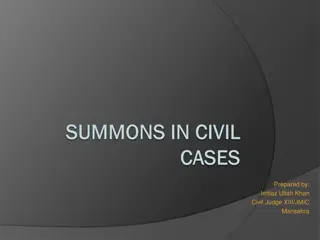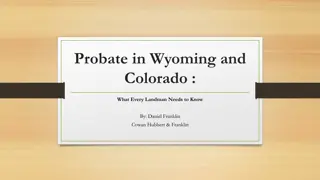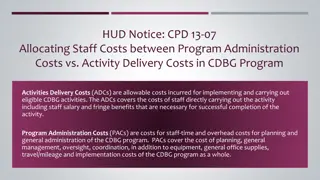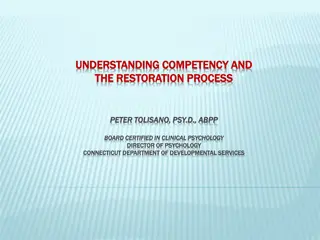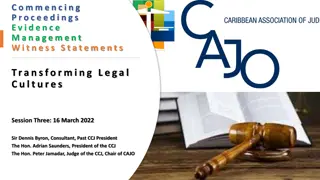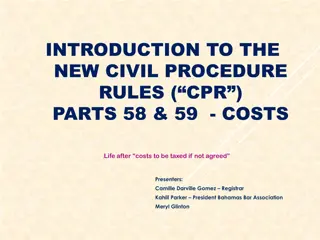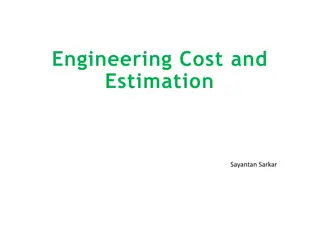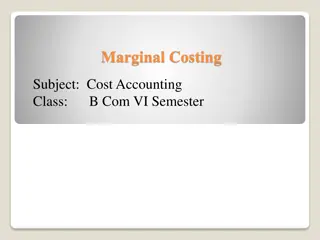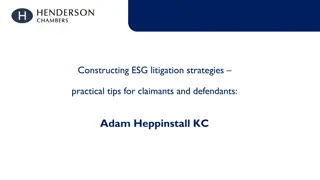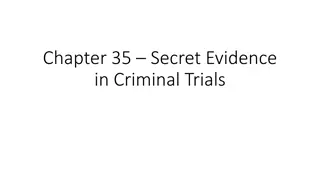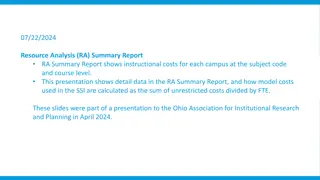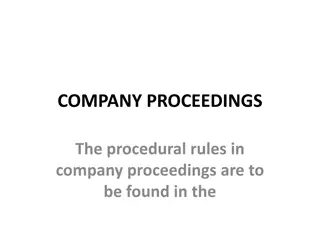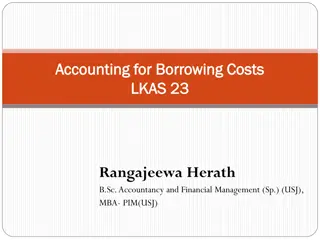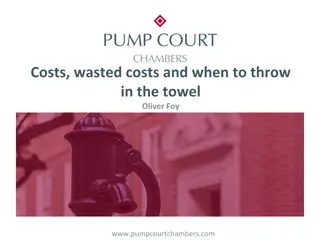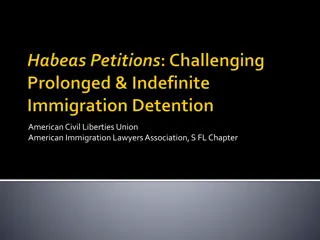Understanding Costs for Defendants in Legal Proceedings
This article provides detailed information on the costs involved for defendants in legal cases, including the starting point for cost allocation, costs at different stages of the legal process, and considerations for recovery of costs. It covers aspects such as costs at the pre-action stage, costs at the permission stage, costs on settlement and discontinuance, and more. The content outlines the general rules and procedures related to cost allocation in legal matters, offering a comprehensive guide for those navigating the legal system.
Download Presentation

Please find below an Image/Link to download the presentation.
The content on the website is provided AS IS for your information and personal use only. It may not be sold, licensed, or shared on other websites without obtaining consent from the author. Download presentation by click this link. If you encounter any issues during the download, it is possible that the publisher has removed the file from their server.
E N D
Presentation Transcript
Costs for Defendants Andrew Sharland QC & Joanne Clement 15 April 2020 3 July 2019
2 Contents Costs: The starting point Costs at the pre-action stage Costs at the permission stage Costs on settlement and discontinuance Costs after a substantive hearing Costs against Courts and Tribunals Costs in judicial review claims in the Upper Tribunal 11kbw.com
3 The starting point Section 51 Senior Courts Act 1981 and CPR 44 Broad discretion as to who pays and how much General rule is that the unsuccessful party is ordered to pay the successful party s costs 11kbw.com
4 Costs at the pre-action stage If as a result of pre-action correspondence from a potential Claimant, a public body withdraws or reconsiders the decision before a claim is issued there will be no costs recovery The Court has no power to make an award of costs unless and until a claim is commenced, see s 51 SCA 1981. Courts deprecate the pursuit of litigation solely to recover costs 11kbw.com
5 Costs at the permission stage (1) If permission granted CPR 44.13(1A)(b) Claimant's costs in the case but can seek an alternative order If permission is refused on the papers Defendant usually entitled to reasonable costs of drafting acknowledgement of service and summary grounds of resistance ( acknowledgement costs ), see Mount Cook, Ewing and Roundham and Larling Parish Council If multiple defendants and interested parties, each one is generally entitled to recover their acknowledgement costs subject to proportionality: Campaign to Protect Rural England v SSCLG [2020] 1 WLR 352 However generally Defendants and Interested Parties are not entitled to recover preparation costs , ie all costs incurred other than acknowledgement costs , see Davey [2008] 1 WLR 878 Procedure: request in summary grounds of resistance supported by a Costs Schedule. Judge, if refusing permission on the papers, should include a decision whether to award costs in principle or not. The Claimant has 14 days to respond in writing with other parties having 14 days to reply. 11kbw.com
6 Costs at the permission stage (2) If permission is refused after an oral hearing Defendants and Interested Parties are not normally entitled to the costs of attending the hearing Exceptions: Hopeless claims Abuse of procedure: political means Claimant has had the benefit of a full argument (eg rolled up hearings) Unsuccessful claimant has substantial resources Recent example: R (Wilson) v Prime Minister [2019] 1 WLR 4174 Day long permission hearing a claim challenging the decision to notify the EU that the UK intended to leave. Hopeless and claimants were inappropriately pursuing what was effectively a political campaign through the courts 11kbw.com
7 Discontinuance, withdrawal and settlement (1) Discontinuance a unilateral termination of a claim by the Claimant. Conceptually distinct from withdrawal by consent or settlement, see R (National Association of Probation Officers) v SSJ [2014] EWHC 4706 CPR 38.6 provides that unless the court orders otherwise, the claimant is liable for the costs of the defendant incurred on or before the date on which the notice of discontinuance was served on it. R (Smoke Club Ltd) v Network Rail Infrastructure Ltd [2014] Costs LO 123: relationship between Mount Cook and CPR 38.6 Nelson s Yard Management Co v Eziefula [2013] C P Rep 29: departure from usual approach as a result of Defendant s unreasonable conduct 11kbw.com
8 Discontinuance, withdrawal and settlement (2) Withdrawal/settlement If the Claimant withdraws claim and there has been no relevant change of position by the Defendant, the Claimant likely to be ordered to pay the Defendant s costs. If there is a change of position by the Defendant the appropriate costs order will usually depend on the extent to which the Claimant has achieved the result that he or she was seeking. The Court of Appeal in M v Croydon [2012] 1 WLR 2607 suggested that there were three broad categories of case: Where the Claimant has been wholly successful in terms of the relief sought the Claimant will generally recover all of his/her costs unless there is a good reason to the contrary. Where a Claimant has only succeeded in part, the judge will normally determine how reasonable the Claimant was in pursuing the unsuccessful relief and how important the unsuccessful relief was compared with the successful relief. Where the compromise does not actually reflect the Claimant s claims the default position is that there should be no order as to costs. 11kbw.com
9 Discontinuance, withdrawal and settlement (3) M v Croydon has led to a large number of costs challenges including: Baxter [2016] 1 Costs LO 37 Tesfay [2016] 1 WLR 4853 ZN [2018] EWCA Civ 1059 Khan [2018] EWCA Civ 1684 RL [2019] 1 WLR 224 Medway Soft Drinks Ltd [2019] EWCA Civ 1041 Parveen [2020] 4 WLR 53 11kbw.com
10 Discontinuance, withdrawal and settlement: Procedure See Administrative Court Office Guidance April 2016 reproduced in Annex 5 to The Administrative Court: Judicial Review Guide, July 2019 The parties should seek to reach agreement on costs wherever possible If the parties cannot agree: Within 28 days of the consent order, the Defendant may file with the Court and serve on the other parties, submissions as to what the appropriate costs order should be The Claimant may reply within 14 days of service The Defendant may file a response to the Claimant s reply within 7 days Written submissions limited to 2 pages of A4 in normal font. These submissions must identify the issues/reasons why the parties cannot agree, identify the amount of costs in issue, state the relief sought in the claim form and the relief obtained and address how the claim and the basis of its settlement fit the principles of M v Croydon and Tesfay (and presumably subsequent Court of Appeal authority) 11kbw.com
11 Costs after a substantive hearing General rule: costs follow the event, see CPR 44.3(2)(a) Who is the successful party: R (Hunt) v North Somerset Council [2015] 1 WLR 3575: if the Claimant establishes illegality, he/she is generally regarded as the successful party even if no relief is granted Grounds for departing from the general rule Unsuccessful ground of challenge or defence: eg Hunt but cf Woods [2019] EWHC 3631 (Admin) Conduct of the parties: eg failure to reply to pre-action protocol letter, Aegis Group Plc [2005] EWHC 1468 Unreasonable failure to engage in ADR: Halsey, Crawford [2014] EWHC 1197 (Admin) Claims brought in the public interest Offers to settle: Hemming [2013] EWCA Civ 591, London Oratory School [2015] EWHC 1155 (Admin) 11kbw.com
Courts and tribunals (1) In R (Davies) v Birmingham Deputy Coroner [2004] 1 WLR 2739, the Court of Appeal held that, unless it has acted improperly or has actively participated in the challenge, a court or tribunal is not required to pay the costs of rectifying a judicial act (whether by way of judicial review or appeal). Needless to say, there is an abundance of case-law concerning the identification of judicial acts, what is meant by the maintenance of neutrality, and what is meant by acting improperly. The Court of Appeal in R (Gudanaviciene) v First-tier Tribunal [2017] 1 WLR 4095 applied Davies when a claim is settled
13 Courts and Tribunals (2) R (Gourlay) v Parole Board [2017] EWCA Civ 1003 Application of Davies principle to The Parole Board Court of Appeal held that the reasoning applied to challenges to decisions of the Parole Board CA rejected the Claimant s argument to the effect that Davies had to be read in the light of M v Croydon Appeal listed before the Supreme Court 11kbw.com
14 Wasted Costs Section 51(6) Senior Courts Act 1981 Grounds Acting improperly, unreasonably or negligently Conduct caused a party to incur unnecessary costs In all the circumstances just Procedure Examples: MB [2006] EWHC 639 (Admin), Grimshaw [2013] EWHC 4504 (Admin) 11kbw.com
15 Payments on account CPR 44.2(8) Where the Court orders costs subject to detailed assessment it will order the party to pay a reasonable sum on account of costs unless there is a good reason not to do so. Far easier to determine the reasonable sum if the judge has heard the claim Applicable to judicial review claims: see R (The Governing Body of the London Oratory School) v The Schools Adjudicator [2015] EWHC 1155 (Admin) 11kbw.com
16 Security for costs The Court has a power pursuant to CPR 25.13 to make an order for security for costs if one of the conditions set out in CPR 25.13(2) are met Such applications generally rare in judicial review claims The main situation were such an order is likely to be made is when the Claimant is a company set up by guarantee that has been specifically incorporated for the purposes of bringing the claim as such a company is unlikely to have any assets, eg R v Leicestershire County Council, ex p Blackfordby and Boothcorpe Action Group Ltd [2001] Env LR 2 (p 35) 11kbw.com
17 Costs in judicial reviews in the Upper Tribunal Section 29 Tribunals Courts and Enforcement Act 2007 Rule 10, Tribunal Procedure (Upper Tribunal) Rules 2008 2 options: same approach as Administrative Court (general rule unsuccessful party pays the successful party s costs) or same approach as FTT and UT generally (no order as to costs unless unreasonable) Limited case law but broadly, the UT adopts the same approach as the Administrative Court Settled claims apply M v Croydon, see Nwankwo [2018] 1 WRL 2641 and TH (Iran) [2013] EWCA Civ 1027 Wasted Costs: SN [2015] UKUT 227 and Okondu [2014] UKUT 377 11kbw.com
Part 2: Contents JRCCOs and considerations for defendants Costs in favour of legally aided parties Costs against legally aided parties 11kbw.com
19 JR COST CAPPING ORDERS 11kbw.com
20 1. JR Cost capping orders Criminal Justice and Courts Act 2015 Section VI of rule 46 CPR Sections 88-90 (s90 Aarhus costs) CCO: Order limiting or removing the liability of a party to JR proceedings to pay another party s costs in connection with any stage of the proceedings CCO: can only be made if permission to apply for JR has been granted 11kbw.com
21 1. CCO: what meant by judicial review proceedings (1) Application for leave to apply for JR; application for JR (2) Application for leave to appeal from (1) and proceedings on appeal from (1) 11kbw.com
22 1. Costs capping orders: three conditions (similar to PCOs) An issue that is the subject of the proceedings is of general public importance The public interest requires the issue to be resolved Proceedings likely to provide appropriate means of resolving it Proceedings are public interest proceedings ONLY if: In the absence of the order, the applicant for JR would withdraw the application for JR or cease to participate Similar to requirement for granting a Protective Costs Order It would be reasonable for the applicant for JR to do so Similar to requirement for granting a Protective Costs Order 11kbw.com
1. Public Interest Proceedings How will Court determine whether proceedings are public interest proceedings ? Court MUST have regard to factors not determinative Section 88(8) - Include not exhaustive list Number of people likely to be directly affected if relief is granted to the applicant for JR How significant the effect on those people is likely to be; and Whether the proceedings involve consideration of a point of law of general public importance (an obvious Supreme Court point ?)
24 1. JRCCOs: Factors court must have regard (s89(1)) Financial resources of parties, including resources of person who provides/ may provide financial support Extent to which applicant likely to benefit if relief is granted to applicant Extent to which supporter likely to benefit if relief is granted to applicant Legal representatives for applicant acting free of charge Applicant is appropriate person to represent the interests of others or the public interest 11kbw.com
25 1. CCO: Reciprocal Costs Cap CCO that limits or removes liability of applicant for JR to pay the costs of another party to proceedings if relief is not granted to the applicant MUST ALSO limit or remove liability of other party to pay applicant s costs (section 89(2)) Not necessarily same amount 11kbw.com
2. JRCCOs: Procedure Appn normally contained in claim form or accompany it Evidence why JRCCO should be made, addressing 3 conditions Summary of C s financial resources assets, liabilities, income, expenditure Any financial support any person provided/likely to provide Costs (and disbursements) which C considers parties are likely to incur in future conduct of proceedings
2. JRCCOs: Procedure If D wishes to resist the making of the JRCCO - set out its reasons in the AoS Any representations on a reciprocal costs cap (capping both parties costs) - made in the AoS C usually liable for D s costs in successfully resisting application for JRCCO If J grants permission to apply for JR on the papers, will go on to consider whether to grant JR CCO. If refused on papers, C can request that decision on JRCCO be reconsidered at a hearing (only revisited if exceptional circumstances now doubted)
2. JRCCOs: Procedure If C is a body corporate - demonstrate that it is likely to have financial resources available to meet liabilities arising in connection with proceedings? If it cannot, court consider giving directions for provision of information about members and ability to provide financial support for purpose of JR If C is unincorporated association, may have security for costs issue If C has sought oral hearing to reconsider refusal of JRCCO, C will usually be liable for D s costs incurred in resisting the JRCCO. Appn for JRCCO can be made at any time, not just when lodging the claim. But this is discouraged by the court
3. CCO examples: Beety R (Beety) v Nursing and Midwifery Council [2017] EWHC 3579 (Admin) Independent midwives in private practice. NMC decided professional indemnity arrangements not sufficient C argued issue was important to all midwives and other healthcare professionals and to pregnant women they helped. NMC argued issued affected only about 70 midwives out of 43,000. Identify the issue by reference to statements of case (claim and defence) Did not involve a point of law of general public importance CCO warranted, even though case marginal on public interest point
3. CCO examples: Beety Those impacted C midwives and other IMUK members directly affected. Small proportion of overall midwives, but were significantly affected Potential clients and families not directly affected C would withdraw if no cap. Reasonable to do so. NMC costs approx. 250k, plus own legal costs. Would bankrupt the individual claimants NMC had substantial assets, 41 million in bank. Individual Cs not contributed; members contributed, crowdfunded 25k, IMUK pledged all its resources ( 40k) C s lawyers were not acting pro bono (CFA on reduced rates). Not fair on public law solicitors to require them to do so
3. CCO examples: Beety Independent midwives earned modest incomes. If matter important to them, then right that they make a larger contribution than they had so far. CCO warranted. Approx 50 members of IMUK had not contributed. If each contributed further 100, further 5,000 could be raised, so cap should be 25,000. Reciprocal cap - 65,000
3. CCO Examples : Hawking R (Stephen Hawking and others) v Secretary of State for Health and Social Care and National Health Services Commissioning Board (NHS England) [2018] EWHC 989 (Admin) Introduction of Accountable Care Organisations. CCO refused on the papers C crowdfunded 160k, target of another 100k. No test of exceptionality unrestricted right to set aside, vary or discharge order made on the papers Passage in Admin Court guide just meant that claimants should not expect paper decisions to be overturned regularly. No need for exceptional or compelling reasons before making an order which was refused on the papers Dispensed with need for evidence on resources to be served on D (r.46.17(3))
3. CCO examples: Hawking Fact permission granted did not automatically mean public interest test met Considerable public interest in decision making process that led to ACOs. BUT D agreement to consult did reduce public interest test. Some of concerns of transparency and excess of power remain high public interest even if also addressed in the consultation Cs individuals, facing potentially open ended costs liabilities, where D s costs estimates are very high. D also facing significant costs, given CFA C would not continue with the claim in absence of a JRCCO. Claim brought out of public spiritedness. Prepared to meet substantial proportion of D s costs through crowdfunding. Unreasonable for them to bear burden of high degree of financial risk. Acted reasonably in not continuing
34 3. Terms of CCO: Hawking Public funding on both sides Crowdfunding for C; public funding for D Set cap at level not artificially limit either C/D efforts or expenditure Enable claim to be heard Case distinguished Principal purpose of proceedings acutely personal C had very substantial means D s projected costs 40,000 Litvinenko Reciprocal cost cap Crowdfunded 160k. Hope for another 100k C s estimated costs 115k Cost cap of 80k for both defendants Reciprocal cap of 115k 11kbw.com
3. CCO examples: We Love Hackney R (We Love Hackney Ltd) v Hackney LBC [2019] EWHC 1007 (Admin) JR claim of revised licensing policies in Hackney Revised Special Policy Areas and changed core hours policy for licensed premises in Hackney. C objected to general rule alcohol no longer sold after midnight on Friday/Saturday nights and extension of SPAs in Shoreditch/Dalton Association, incorporated for JR
3. CCO examples: We Love Hackney Not public interest proceedings No point of law of general public importance Company itself impecunious Number of wealthy directors and backers who could fund the claim Commercial interest in the litigation
3. CCO examples: We Love Hackney Must have section 88(8) factors in mind, but can have regard to other factors Section 88(8)(a) mentions persons directly affected by grant of relief, but court can also consider those indirectly affected Crowdfunding target of 20k met. Continuing to crowdfund to meet stretch target of 53k. Not a public interest claim Essential challenge LA failed to have regard to the PSED in formulating its SLP Local issues framed by reference to local government policy might in principle raise issues of general importance. But argument here was specific to the facts of the case
3. CCO examples: We Love Hackney No point of law of general public importance Key principles on PSED all well established. Just applying those to the facts of this case. What D did or did not do in formulating its policy Failure to take account of relevant considerations tied to facts of the case No general principle of law on which the parties disagreed likely to be directly affected do not include anyone works in licensed premises, goes for late night drink, wishes at some stage to invest in activities in Hackney. Too broad Those who are directly affected effect hard to measure. Community not speak with uniform voice. Difficulties in measuring direct effect reduces weight of this factor. Indirectly affected, even more so
3. CCO examples: We Love Hackney Industry driven campaign with resources to resurrect challenge if this case did not proceed? D produced evidence about the directors of the company successful individuals with access to considerable resources. Two of directors had commercial interest in the outcome of the litigation Accepted claim would be withdrawn if no CCO BUT not reasonable to do so absent compulsion to withdraw through impecuniosity A number of well-resourced individuals have chosen to litigate the claim via an impecunious company which has taken possession of funds donated by members of the public. Given their individual and cumulative financial resources, I infer that the directors and other backers do not want to fund the litigation beyond the level of third party support, rather than that they are incapable of doing so. I do not accept on the evidence before me that the claimant would be forced to withdraw the claim through impecuniosity.
4. Costs reduction R (Elan-Cane) v Secretary of State for the Home Department [2020] EWCA Civ 363 JR of refusal of HMG to issue a non-gendered passport Parties agreed a mutual costs cap of 3,000. JR claim dismissed. No breach of Article 8, but found Article 8(1) engaged. C ordered to pay SoS s costs, reduced by 33%. J applied reduction to capped costs SoS appealed against costs order - should have applied reduction to actual costs, not capped costs CA dismissed SoS appeal.
41 4. Costs reduction Public policy behind CCOs promote access to justice in JR claims with a public interest Know maximum costs exposure costs actually incur irrecoverable Court not required to award costs at conclusion of hearing as though cap did not exist Lead to lax practice / unreasonable litigation conduct if party knew could always recover full amount of capped costs, even if factors justify substantial reduction in uncapped costs 11kbw.com
42 5. Revoking a JRCCO R (Harvey) v Leighton Linsdale Town Council [2019] EWHC 760 (Admin) CCO granted, LA applied to set aside/vary it Obligation to disclose financial resources included resources that might not be immediately available / might be able to obtain in due course (such as C s potential inheritance in 12/18 months) Failure to disclose inheritance was material non-disclosure. Not deliberate. Information might have affected J decision. CCO set aside and new one imposed at a higher level ( 20k) 11kbw.com
5. Revoking a JRCCO No specific statutory power to revoke/vary - CPR rule 3.17 Admin Court Guide says where court reconsiders at a hearing whether or not to make a JRCCO, the paper decision should only be revisited in exceptional circumstances Harvey no authority for this. Failure to give full and frank disclosure, failure comply with obligations of Act, founds jurisdiction for Court to review decision it has made Cited 31 of Buglife No general power to revisit decision on CCO
44 COSTS ORDERS AND LEGAL AID 11kbw.com
1. Orders in favour of legally aided Cs Regulation 21 of the Civil Legal Aid (Costs) Regulations 2013 Amount of costs to be paid under a legally aided party s costs order or costs agreement must be determined as if that party were not legally aided Reg. 21(4) - amount of costs is not limited, by any rule of law which limits the costs recoverable by a party to proceedings to the amount the party is liable to pay their representatives, to the amount payable to the provider in accordance with the legal aid arrangements Legally aided C to recover costs at his lawyer s ordinary commercial rates (not those paid under legal aid regime)
1. Orders in favour of legally aided Cs ZN (Afghanistan) v Secretary of State for the Home Department [2018] EWCA Civ 1059 Discussion of comments in JFS about the impact of not recovering costs on lawyers who undertake publicly funded work. Fact that one party is legally aided could be taken into account when deciding on an award of costs, but it is unlikely to affect the outcome See also R (Sino) v Secretary of State for the Home Department [2016] EWHC 803 (Admin) When assessing costs, court can take into account fact lawyers doing publicly funded work might not recover their costs at a commercial rate
2. Orders against legally aided Cs Costs protection conferred by LA certificate High Court successful D will not recover costs Different in CA/SC
2. Costs in High Court 1. The Claimant shall pay the Defendant s reasonable costs of the claim, to be subject of a detailed assessment on the standard basis if not agreed. 2. The Claimant s liability to pay costs under paragraph (1) shall not be enforced save following and in accordance with a determination by the costs judge of the amount which it is reasonable for the Claimant to pay in accordance with section 26(1) of the Legal Aid, Sentencing and Punishment of Offenders Act 2012. 3. The Claimant s costs of the claim shall be the subject of detailed assessment in accordance with the Civil Legal Aid (Costs) Regulations 2013
2. Costs in High Court In principle, costs follows the event C ordered to pay D s costs Section 26(1) of LASPO costs ordered against an individual in receipt of legal aid in civil proceedings must not exceed the amount (if any) which it is reasonable for the individual to pay having regard to all the circumstances, including (a) the financial resources of all of the parties to the proceedings; and (b) their conduct in connection with the dispute Regulations determine what is reasonable - Civil Legal Aid (Costs) Regulations 2013 Assessment of resources regulation 13
2. Costs against the LC in High Court Regulation 10 of the Civil Legal Aid (Costs) Regulations 2013 Amount individual ordered to pay under s26 of LASPO less than full costs Regulation 10(2) court may make an order for payment by the Lord Chancellor to the non-legally aided party of the whole/any part of costs incurred by that party (other than costs LA party is required to pay under s26) Four conditions

 undefined
undefined




